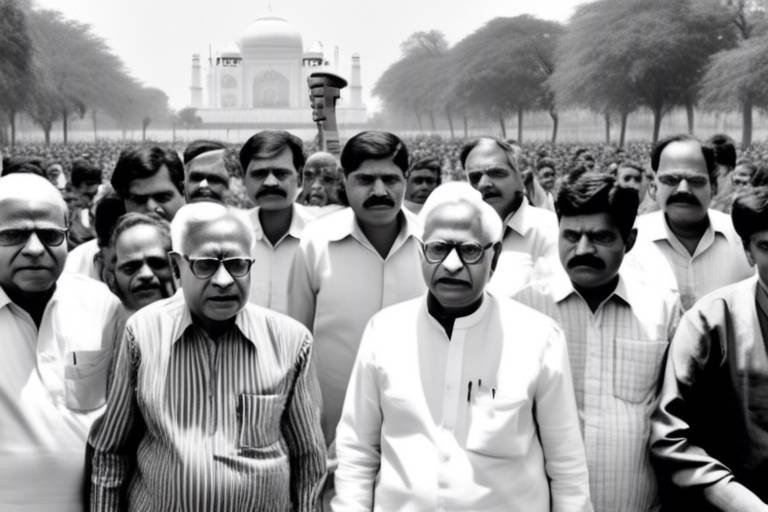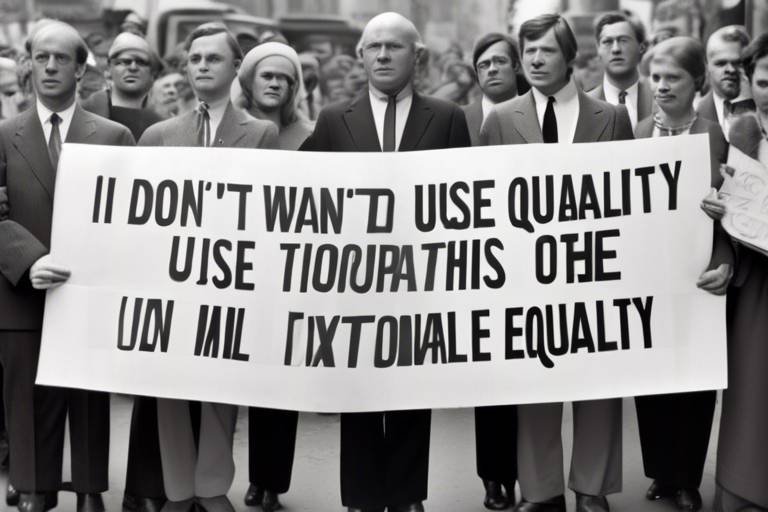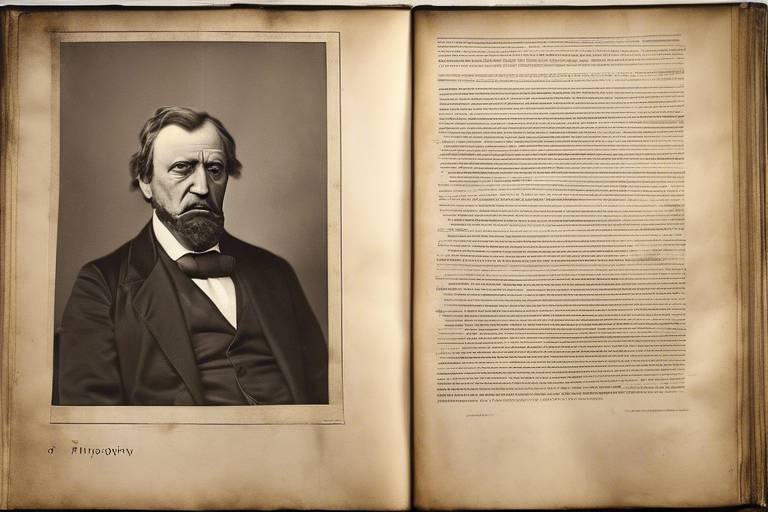Rediscovering the Philosophical Wisdom of Indian Politics
In a world that often feels chaotic and disjointed, rediscovering the philosophical wisdom embedded in Indian politics offers a refreshing perspective. It's like finding a hidden gem in a cluttered attic—once you uncover it, the beauty and relevance of ancient thought shine brightly. Indian political philosophy is not just a relic of the past; it serves as a guiding star for contemporary governance and societal values. The profound insights from ancient texts continue to resonate, providing frameworks that help navigate the complexities of modern political landscapes.
Imagine standing at the crossroads of tradition and modernity, where the teachings of ancient sages meet the realities of today's governance. This intersection is where we find the essence of Indian political thought, rich with philosophical depth and moral clarity. From the strategic brilliance of Kautilya to the ethical visions of Gandhi, the wisdom derived from these thinkers offers invaluable lessons that are just as pertinent now as they were centuries ago. In this article, we will embark on a journey to explore how these ancient philosophies continue to shape the political discourse in India today.
As we delve deeper, it’s important to recognize that Indian political philosophy is not monolithic; it is a tapestry woven from diverse strands of thought. Each philosopher brings their unique perspective, addressing issues like governance, ethics, and the role of the state. This diversity enriches our understanding and encourages a holistic approach to political challenges we face in contemporary society.
So, why should we care about these ancient teachings? Because they provide us with a framework for understanding not just politics, but also the very fabric of society. They challenge us to reflect on our values, question our assumptions, and ultimately strive for a more just and equitable world. Just as a compass guides a traveler, the philosophical principles of Indian politics can guide leaders and citizens alike in making decisions that resonate with the collective moral conscience.
In the following sections, we will explore the historical context of Indian political philosophy, highlight key philosophers and their contributions, and examine how these ancient insights inform modern governance. By engaging with these ideas, we can better appreciate the rich legacy of Indian political thought and its relevance in our quest for a more enlightened political landscape.
- What is Indian political philosophy?
Indian political philosophy encompasses a range of ideas and theories from ancient to modern times, focusing on governance, ethics, and the role of the state. - Who are the key philosophers in Indian political thought?
Notable philosophers include Kautilya, known for his work "Arthashastra," and Mahatma Gandhi, who emphasized non-violence and moral governance. - How does ancient wisdom apply to modern politics?
Ancient philosophical principles provide frameworks for ethical governance, social justice, and the responsibilities of political leaders in today's society. - What are some challenges in integrating philosophical ideas into politics?
Challenges include resistance to change, political polarization, and the complexity of applying abstract principles to real-world scenarios.

The Historical Context of Indian Political Philosophy
To truly grasp the essence of Indian political philosophy, we must embark on a fascinating journey through its historical evolution. This journey begins in the depths of ancient texts, where wisdom was not only sought but revered. The philosophical underpinnings of Indian politics can be traced back thousands of years, with seminal works like the Vedas, Upanishads, and the Mahabharata laying the groundwork for political thought that resonates even today. These texts are not merely historical relics; they are vibrant sources of insight into governance, ethics, and the role of the state.
As we move through time, we encounter the profound teachings of various philosophers who contributed significantly to political discourse. For instance, the ancient sage Kautilya, also known as Chanakya, authored the Arthashastra, a treatise that intricately weaves together strategy, economics, and governance. His work exemplifies how ancient wisdom can inform modern political practices. Similarly, the teachings of Mahatma Gandhi introduced a moral dimension to politics, emphasizing non-violence and ethical governance. These figures represent just a fraction of the rich tapestry of thought that has emerged from Indian soil.
The historical context of Indian political philosophy is also shaped by the cultural and social dynamics of different eras. From the Mauryan Empire to the Mughal period, each era brought forth unique challenges and perspectives that influenced political thought. The interplay of religion, culture, and politics created a distinctive framework in which governance was not only about authority but also about fulfilling a moral duty to the people. This sense of duty, or dharma, continues to be a guiding principle in contemporary Indian politics.
Moreover, the colonial period introduced a new set of challenges and philosophical inquiries. The clash between traditional Indian values and Western political ideologies led to a rich dialogue that questioned the very nature of governance and justice. This period saw the emergence of leaders and thinkers who sought to reconcile these differing philosophies, ultimately shaping a unique Indian identity in the political realm.
In summary, the historical context of Indian political philosophy is a complex interplay of ancient wisdom, cultural evolution, and responses to contemporary challenges. It is a narrative that highlights the enduring relevance of philosophical thought in shaping governance and societal values in India. By understanding this context, we can appreciate how these ancient ideas continue to influence modern political practices and the ethical frameworks that guide leaders today.

Key Philosophers and Their Contributions
When diving into the rich tapestry of Indian political thought, it’s impossible to overlook the profound impact of key philosophers whose ideas have shaped governance and societal values through the ages. Their contributions resonate even in today's political landscape, offering insights that are both timeless and relevant. Among these thinkers, Kautilya and Mahatma Gandhi stand out as towering figures, each representing distinct yet complementary approaches to politics and ethics.
Kautilya, also known as Chanakya, authored the Arthashastra, a seminal text that serves as a manual for political strategy and statecraft. Written in ancient India, this work delves into the intricacies of power dynamics, diplomacy, and economic management. Kautilya’s philosophy is often characterized by a pragmatic realism that encourages leaders to understand the harsh realities of governance. His famous assertion that "the end justifies the means" encapsulates his belief in the necessity of strategic cunning in political affairs. This perspective remains remarkably relevant, as modern political leaders often find themselves navigating complex situations that require a blend of ethical considerations and practical decision-making.
In contrast, Mahatma Gandhi’s vision of politics was deeply rooted in the principles of non-violence and moral governance. He advocated for a political system that prioritizes ethical values and social justice, emphasizing that true governance must reflect the collective will of the people. Gandhi's approach was revolutionary; he believed that political change should arise from the grassroots level, empowering citizens to take charge of their destinies. His philosophy has inspired numerous movements around the world, promoting the idea that moral integrity should underpin political action.
To better appreciate the contributions of these philosophers, let’s compare their core principles in the table below:
| Philosopher | Key Work | Main Contribution | Philosophical Approach |
|---|---|---|---|
| Kautilya | Arthashastra | Political strategy, statecraft | Realism |
| Mahatma Gandhi | Various writings | Non-violence, moral governance | Idealism |
The contrasting philosophies of Kautilya and Gandhi illustrate the duality of Indian political thought. Kautilya’s realist approach provides a framework for understanding the mechanics of power, while Gandhi’s idealism offers a vision of governance that is compassionate and ethical. Together, they paint a comprehensive picture of what Indian politics can be—a blend of strategic prowess and moral integrity.
Furthermore, the ideas of these philosophers continue to influence contemporary political discourse. For instance, Kautilya’s insights into statecraft can be seen in the strategic maneuvers of modern politicians, while Gandhi’s emphasis on social justice fuels movements advocating for equity and human rights. This interplay between ancient wisdom and modern practice highlights the enduring legacy of these thinkers in shaping the values and principles that guide governance in India today.
As we explore the philosophical landscape of Indian politics, we can appreciate how these key figures have laid the groundwork for ongoing discussions about governance, ethics, and the role of the state. Their contributions remind us that understanding the past is crucial for navigating the complexities of the present and future. In a world where political challenges are ever-evolving, the teachings of Kautilya and Gandhi offer valuable lessons that continue to resonate with leaders and citizens alike.
- Who was Kautilya? Kautilya, also known as Chanakya, was an ancient Indian philosopher and strategist, best known for his work, the Arthashastra, which focuses on statecraft and political strategy.
- What is the significance of Gandhi's philosophy? Gandhi's philosophy emphasizes non-violence and ethical governance, advocating for social justice and the empowerment of citizens in political processes.
- How do Kautilya and Gandhi's ideas apply today? Their ideas remain relevant, influencing contemporary political strategies and social movements, highlighting the importance of balancing power dynamics with ethical considerations.

Kautilya's Arthashastra
Kautilya's Arthashastra is not just a mere ancient text; it's a treasure trove of political wisdom that has stood the test of time. Written in the 4th century BCE, this remarkable work offers a deep dive into the intricate world of governance, statecraft, and economic management. But what makes the Arthashastra so relevant even in today's fast-paced political landscape? The answers lie in Kautilya's keen understanding of human nature and the complexities of power dynamics.
At its core, the Arthashastra is a manual for rulers, filled with practical advice on how to maintain power and ensure the stability of the state. Kautilya, also known as Chanakya, believed that the ends often justify the means. This pragmatic approach, which some may label as ruthless, emphasizes the importance of strategy and foresight in governance. In a world where political leaders are often faced with moral dilemmas, Kautilya's insights provide a framework for making tough decisions that prioritize the state's welfare.
One of the most compelling aspects of the Arthashastra is its exploration of the relationship between the ruler and the ruled. Kautilya posited that a ruler must be both a lion and a fox: fierce yet cunning. This duality is crucial for effective governance, as it allows leaders to navigate the treacherous waters of political intrigue while maintaining the trust of their citizens. Kautilya's emphasis on intelligence and espionage further underscores the importance of being well-informed and prepared for any eventuality.
Moreover, the Arthashastra delves into various aspects of statecraft, including:
- Diplomacy: Kautilya advocated for shrewd diplomatic strategies, emphasizing the need for alliances and negotiations to bolster the state's power.
- Economics: The text outlines principles of economic management, highlighting the significance of a strong economy as the backbone of a stable state.
- Military Strategy: Kautilya provides insights into warfare, stressing that a ruler must always be prepared for conflict while also seeking peaceful resolutions.
In essence, Kautilya's Arthashastra serves as a reminder that political wisdom is not static; it evolves with the times while retaining its core principles. The text's enduring relevance is evident in its application to modern political strategy, where leaders continue to draw upon Kautilya's teachings to navigate complex challenges. Whether it's managing economic crises or engaging in international diplomacy, the Arthashastra remains a guiding light for those in power.
As we reflect on Kautilya's contributions, it's essential to recognize that his insights are not merely historical artifacts but living philosophies that resonate with contemporary governance. The principles laid out in the Arthashastra encourage leaders to blend pragmatism with ethical considerations, ensuring that the pursuit of power does not come at the expense of justice and welfare. In today's world, where political landscapes are often polarized and contentious, Kautilya's wisdom offers a pathway to more effective and compassionate governance.
- What is the main focus of Kautilya's Arthashastra?
The main focus is on practical governance, statecraft, and economic management, providing strategies for rulers to maintain power and stability. - How does Kautilya's philosophy differ from modern political thought?
Kautilya emphasizes a pragmatic approach that often prioritizes state welfare over ethical considerations, which can contrast with more idealistic modern political theories. - Can Kautilya's teachings be applied today?
Yes, many of Kautilya's insights into diplomacy, economics, and military strategy remain relevant and are utilized by contemporary political leaders worldwide.

Realism vs. Idealism in Kautilya's Thought
Kautilya, also known as Chanakya, is often celebrated as one of the most astute political strategists in Indian history. His seminal work, the Arthashastra, serves as a comprehensive guide to statecraft, economics, and military strategy. At the core of Kautilya's philosophy lies a fascinating interplay between realism and idealism. This tension is not just an academic debate; it has profound implications for how we understand governance and ethical leadership today.
Realism in Kautilya's thought is characterized by a pragmatic approach to power dynamics. He believed that the political landscape is inherently fraught with conflict and competition. This perspective urges leaders to be shrewd and often ruthless in their pursuit of power. Kautilya famously stated, "The world's a battlefield," suggesting that one must always be prepared for the challenges that lie ahead. In this sense, he advocates for a form of governance that prioritizes results over ideals. For instance, his strategies often included manipulation and espionage, reflecting a deep understanding that the ends can justify the means in the realm of politics.
On the other hand, Kautilya did not entirely dismiss idealism. He recognized that a ruler must also embody certain ethical principles to maintain legitimacy and public trust. This duality is crucial; while a leader must navigate the murky waters of political reality, they must also aspire to uphold a moral framework. Kautilya's ideal ruler is not just a power-hungry strategist but also a guardian of societal welfare. This is where the concept of dharma comes into play, as it balances the often harsh realities of governance with the ethical responsibilities towards the people.
To illustrate this balance between realism and idealism, consider the following table that summarizes key aspects of Kautilya's philosophy:
| Aspect | Realism | Idealism |
|---|---|---|
| Approach to Power | Pragmatic, often ruthless | Ethical, principled |
| View of Human Nature | Cynical, self-interested | Optimistic, capable of goodness |
| Governance Strategy | Manipulation, strategic deception | Justice, public welfare |
This nuanced perspective is particularly relevant in today's political climate, where leaders are often faced with the dilemma of choosing between ethical governance and pragmatic decision-making. Kautilya's insights encourage us to reflect on the complexities of leadership and the importance of balancing these opposing forces. For instance, in contemporary politics, we see leaders who may adopt Kautilyan tactics in their pursuit of power, yet are also held accountable to the ideals of transparency and social justice. This ongoing dialogue between realism and idealism continues to shape political discourse and governance practices.
Ultimately, Kautilya's teachings remind us that effective governance is not a black-and-white issue. Rather, it exists in a spectrum where leaders must navigate the murky waters of reality while striving to uphold the ideals that inspire and unite their constituents. This delicate balance is crucial for fostering trust and ensuring that governance remains responsive to the needs of the people.

Impact on Modern Political Strategy
The teachings of Kautilya, particularly from his seminal work, the Arthashastra, have had a profound impact on modern political strategy. His insights into the nature of power, governance, and statecraft are not just relics of ancient history; they are frameworks that contemporary leaders and strategists often rely on. In a world where political landscapes are constantly shifting, Kautilya's emphasis on pragmatic realism over idealism offers a lens through which modern politicians can navigate the complexities of governance.
One of the key aspects of Kautilya's strategy is the understanding of realpolitik—the idea that politics should be based on practical and material factors rather than moral or ideological considerations. This approach has found resonance in various political strategies today, where leaders prioritize strategic alliances and power dynamics over traditional ethical concerns. For instance, in international relations, countries often engage in negotiations that reflect Kautilya's principles, focusing on national interest rather than ideological alignment.
Moreover, Kautilya's emphasis on intelligence and information gathering is incredibly relevant today. In an age dominated by information warfare and digital diplomacy, the ability to gather, analyze, and act on information is a critical component of successful political strategy. Modern political campaigns and statecraft heavily rely on data analytics, a practice that echoes Kautilya's insistence on the importance of spies and intelligence in governance.
To illustrate the impact of Kautilya's strategies on modern political contexts, consider the following table that outlines key principles from the Arthashastra and their contemporary applications:
| Kautilya's Principle | Modern Application |
|---|---|
| Realpolitik | Focus on national interests in foreign policy |
| Intelligence and Information | Data analytics in political campaigns |
| Strategic Alliances | Building coalitions for political leverage |
| Power Dynamics | Understanding and managing power relations in governance |
Furthermore, Kautilya’s teachings on economic management and resource allocation remain pertinent in today’s political discourse, especially in developing nations where economic stability is crucial for political legitimacy. The emphasis on shrewd economic governance and the importance of a strong economy as a foundation for political power cannot be overstated. Leaders who grasp these concepts are better equipped to foster stability and growth in their nations.
In conclusion, the impact of Kautilya's political strategies on modern governance is undeniable. His teachings provide a blueprint that transcends time, offering insights that remain relevant in addressing contemporary political challenges. As leaders grapple with the complexities of today's political arena, revisiting the wisdom of ancient philosophers like Kautilya can illuminate pathways to effective governance and strategic success.
- What is Kautilya's Arthashastra?
It is an ancient Indian text that outlines strategies for governance, statecraft, and economic management.
- How does Kautilya's philosophy apply to modern politics?
Kautilya's ideas on realism, intelligence, and strategic alliances are utilized by contemporary political leaders to navigate complex political environments.
- Why is Kautilya's approach to governance considered timeless?
His insights into power dynamics and pragmatic governance resonate with the challenges faced by modern leaders, making his teachings applicable across eras.

Gandhi's Vision of Politics
Mahatma Gandhi, a towering figure in the Indian independence movement, had a profound vision of politics that was deeply intertwined with his philosophy of non-violence and moral governance. He believed that politics should not merely be a game of power, but rather a means to achieve social justice and uplift the marginalized. In his view, the essence of politics was rooted in ethical principles and a commitment to the welfare of all, especially the underprivileged. Gandhi's philosophy can be encapsulated in the idea that true political authority comes from adhering to moral values and fostering an inclusive society.
One of the key tenets of Gandhi's political vision was the concept of Satyagraha, or the force of truth. This principle emphasized the power of non-violent resistance as a means to confront injustice. Gandhi argued that individuals should stand firm in their beliefs and fight against oppression without resorting to violence. This approach not only aimed to dismantle colonial rule but also sought to transform the oppressor's heart. Gandhi’s vision was revolutionary in that it challenged the conventional notion of power dynamics, suggesting that moral strength could be more potent than physical force.
Moreover, Gandhi believed in the importance of self-governance and local autonomy. He advocated for the concept of Swaraj, which translates to self-rule. This idea extended beyond political independence; it encompassed economic self-sufficiency and social empowerment. Gandhi envisioned a decentralized political structure where communities would have the autonomy to govern themselves, thereby fostering a sense of responsibility and participation among citizens. This vision of governance resonates with contemporary movements that emphasize grassroots activism and local governance.
Gandhi's emphasis on ethical leadership is another crucial aspect of his political philosophy. He believed that leaders should embody the values they preach, advocating for transparency, integrity, and accountability. In a world where political corruption is rampant, Gandhi’s call for leaders to be role models serves as a pressing reminder of the ethical foundations required for effective governance. His vision encourages us to question the moral compass of our leaders and to prioritize integrity in political discourse.
Today, Gandhi's ideas continue to inspire political movements around the globe. Leaders and activists invoke his principles of non-violence and social justice in their struggles for civil rights, environmental sustainability, and economic equity. His approach to politics, which prioritizes moral values over mere power, offers a refreshing lens through which to view contemporary challenges. As we navigate complex societal issues, Gandhi's vision serves as a guiding light, reminding us that politics is not just about governance, but about fostering a just and compassionate society.
In conclusion, Gandhi's vision of politics emphasizes that true governance is about serving the people with integrity and compassion. His teachings encourage us to reflect on our own political beliefs and practices, urging us to embrace non-violence, ethical leadership, and community empowerment as we strive for a better world.
- What is Satyagraha? Satyagraha is Gandhi's principle of non-violent resistance against oppression, emphasizing the power of truth and moral strength.
- How did Gandhi view leadership? Gandhi believed that leaders should embody ethical values, promoting transparency and accountability in governance.
- What does Swaraj mean? Swaraj means self-rule, advocating for local autonomy and self-sufficiency in governance and community affairs.
- How is Gandhi's vision relevant today? Gandhi's principles of non-violence and social justice continue to inspire modern movements for civil rights, environmental sustainability, and economic equity.

Philosophical Themes in Indian Governance
The landscape of Indian governance is deeply intertwined with its rich philosophical heritage. At the heart of this relationship lies a tapestry woven from various themes that define the moral and ethical framework guiding political leaders and citizens alike. Among these themes, dharma, justice, and the role of the state stand out as pivotal concepts that continue to influence contemporary governance in India.
Dharma, often translated as duty or righteousness, plays a crucial role in shaping political responsibilities. It is a guiding principle that informs leaders about their obligations towards the state and its citizens. In essence, dharma compels leaders to act in a manner that is not only beneficial to themselves but also aligns with the greater good of society. This ethical dimension of governance ensures that decisions are made with a sense of accountability and moral integrity, which is essential in a democratic framework.
Moreover, the concept of dharma extends beyond mere duty; it encompasses the idea of moral governance. Leaders are expected to uphold ethical standards, promoting a political culture that values honesty and transparency. This expectation is reflected in the way citizens engage with their government, demanding accountability and ethical behavior from their elected representatives. The interplay between dharma and governance fosters a political environment where integrity is not just encouraged but expected.
Another significant theme in Indian political philosophy is justice. The discourse surrounding justice in India has evolved over centuries, shaped by various philosophical interpretations. Justice is not merely about legal frameworks; it is about ensuring equity and fairness for all citizens. This principle prompts ongoing discussions about social justice, human rights, and the role of government in rectifying historical injustices.
In contemporary India, the quest for justice often manifests in movements advocating for the rights of marginalized communities. These movements highlight the necessity for a government that not only enforces laws but also actively works towards creating an equitable society. The philosophical underpinnings of justice compel political leaders to consider the broader implications of their policies, ensuring that they address the needs of all, especially the underprivileged.
The role of the state is yet another critical theme in Indian governance. Traditionally, the state is viewed as a custodian of the welfare of its citizens. This perspective is deeply rooted in the notion that the government has a responsibility to create a conducive environment for the flourishing of individuals and communities. In this context, the state is not merely a regulatory authority but a facilitator of social and economic development.
As we navigate the complexities of modern governance, the philosophical themes of dharma, justice, and the role of the state remain relevant. They serve as guiding principles that shape policies and practices in a way that resonates with the values and aspirations of the Indian populace. By integrating these themes into the fabric of governance, India can strive towards a political system that is not only effective but also just and equitable.
- What is the significance of dharma in Indian politics?
Dharma serves as a guiding principle for political leaders, emphasizing their duty to act in the best interest of society while upholding ethical standards.
- How does the concept of justice influence governance in India?
The discourse on justice drives political movements aimed at ensuring equity and fairness, prompting the government to address the needs of marginalized communities.
- What role does the state play in Indian governance?
The state is viewed as a custodian of welfare, responsible for creating an environment conducive to the development and flourishing of its citizens.

Dharma and Its Political Implications
The concept of dharma holds a significant place in Indian political philosophy, serving as a guiding principle that shapes the moral and ethical responsibilities of both leaders and citizens. At its core, dharma refers to the righteousness or moral order that governs individual conduct and societal norms. In the political arena, it transcends mere legality, urging leaders to act in ways that are just and beneficial for the community. This notion of doing what is right, rather than what is merely expedient, creates a framework within which political decisions are made.
In ancient texts, dharma is often depicted as a duty that varies according to one's role in society. For instance, a king's dharma is to protect and govern his subjects justly, while a citizen's dharma might involve participating in civic duties and supporting the state. This intricate web of responsibilities establishes a moral compass that guides interactions between the government and the governed. When political leaders adhere to their dharma, they foster trust and legitimacy, essential components for a stable society.
Moreover, the implications of dharma extend beyond individual actions; they influence the broader fabric of governance. In a democratic setup, the expectation is that elected officials will embody dharma, ensuring that their policies reflect the collective interests of the populace. This creates a symbiotic relationship where the government is accountable to the people, and the people, in turn, are expected to uphold their duties as citizens. Such a balance is crucial for maintaining social harmony and justice.
However, the interpretation of dharma can be complex and sometimes contentious. Different groups may have varying perspectives on what constitutes righteous action, leading to debates and discussions that are essential in a vibrant democracy. For instance, the application of dharma in modern governance may prompt questions about how to balance tradition with contemporary values. This dynamic interplay can lead to progressive reforms as society evolves, reflecting the adaptability of dharma as a guiding principle.
To illustrate the political implications of dharma, consider the following key aspects:
- Ethical Governance: Leaders must prioritize ethical considerations in their decision-making processes.
- Social Justice: Policies should aim to uplift marginalized communities, aligning with dharma's emphasis on fairness.
- Public Accountability: Elected officials are expected to be transparent and accountable to the public, reinforcing the moral fabric of governance.
In conclusion, dharma is not just a philosophical concept; it is a practical guide for political life in India. By grounding political actions in this ancient wisdom, leaders can navigate the complexities of governance with a sense of purpose and integrity. As India continues to grapple with modern challenges, the relevance of dharma in shaping ethical policies and fostering a just society remains as vital as ever.
What is the significance of dharma in Indian politics?
Dharma serves as a moral compass for political leaders and citizens, guiding ethical governance and social responsibilities.
How does dharma influence modern governance?
Dharma encourages leaders to prioritize justice and accountability, fostering trust between the government and the populace.
Can dharma change over time?
Yes, the interpretation of dharma can evolve with societal values, allowing for progressive reforms while maintaining its core principles.

Justice and Equity in Political Discourse
When we dive into the heart of Indian political philosophy, the concepts of justice and equity emerge as pivotal themes that shape the discourse around governance and societal norms. These principles are not just abstract ideas; they are the very fabric that weaves together the aspirations and struggles of a diverse nation. In India, where the population is a vibrant tapestry of cultures, religions, and socio-economic backgrounds, the quest for justice often feels like navigating a complex maze. But what does justice truly mean in this context? Is it merely the absence of oppression, or is it something far more profound?
The discussions surrounding justice and equity are central to understanding the political landscape. At its core, justice involves ensuring that every individual receives what they are due, while equity emphasizes fairness and the need to consider individual circumstances. This duality is crucial in a democracy where the voices of the marginalized must be amplified. The challenge lies in balancing these ideals in a way that promotes social harmony and cohesion.
One of the ways these themes manifest in political discourse is through the lens of social justice. In the Indian context, social justice is about addressing historical injustices faced by various communities, particularly those marginalized by caste, gender, and economic status. The government and various organizations strive to implement policies that not only acknowledge these disparities but actively work towards rectifying them. For instance, affirmative action policies aim to uplift underrepresented groups, ensuring they have access to education, employment, and political representation.
Moreover, the role of the state in ensuring justice cannot be understated. It is not enough for the government to simply legislate; it must also create an environment where laws are enforced fairly and equitably. This is where the principles of dharma come into play, guiding leaders to act in the best interests of all citizens. However, the reality often falls short of this ideal. Corruption, inefficiency, and bias can hinder the quest for justice, leading to a public outcry for reform.
To illustrate the complexities of justice and equity in Indian politics, consider the following table that highlights some of the key issues and their implications:
| Issue | Implications |
|---|---|
| Caste Discrimination | Continues to marginalize communities, affecting their access to resources and opportunities. |
| Gender Inequality | Women often face systemic barriers in education and employment, impacting their socio-economic status. |
| Poverty | Economic disparities lead to unequal access to justice and basic rights, perpetuating cycles of disadvantage. |
These issues highlight the ongoing struggle for justice in India. The dialogue surrounding equity must also address the systemic obstacles that prevent marginalized groups from achieving their rightful place in society. As citizens become more aware of these issues, movements advocating for justice gain momentum, demanding accountability from those in power.
In conclusion, the discourse on justice and equity in Indian politics is not just about legal frameworks; it's about the lived experiences of millions. It challenges us to reflect on our values and the kind of society we wish to build. As we continue to grapple with these concepts, it is essential to engage in open dialogues that encompass diverse perspectives, ensuring that the quest for justice remains inclusive and robust.
- What is the difference between justice and equity? Justice refers to the fair treatment of individuals, while equity focuses on fairness and the need to consider individual circumstances.
- How does Indian political philosophy address social justice? It emphasizes rectifying historical injustices and ensuring marginalized communities have access to resources and opportunities.
- What role does the government play in ensuring justice? The government is responsible for legislating and enforcing laws that promote fairness and protect the rights of all citizens.

Modern Applications of Ancient Wisdom
As we navigate the complexities of contemporary governance, the ancient wisdom of Indian political philosophy offers invaluable insights that resonate with today's challenges. The teachings of great thinkers like Kautilya and Gandhi are not merely relics of the past; they are living philosophies that inform modern political practices. For instance, Kautilya's emphasis on strategic governance can be seen in the way political leaders today approach diplomacy and international relations. His principles of power dynamics, outlined in the Arthashastra, guide modern statesmen as they maneuver through the intricate web of global politics.
Moreover, Gandhi's vision of non-violence and moral governance has inspired numerous movements worldwide, advocating for social justice and ethical leadership. The principles of satyagraha (truth-force) and ahimsa (non-violence) have become cornerstones for activists fighting for civil rights and equality. This demonstrates that ancient philosophies can be effectively applied to modern contexts, encouraging leaders to prioritize ethical considerations over mere political gain.
To illustrate the practical implications of these ancient teachings, we can look at several case studies in contemporary politics where these philosophies have been successfully integrated:
| Case Study | Philosophical Principle | Outcome |
|---|---|---|
| Anti-Corruption Movements in India | Kautilya's Realpolitik | Increased accountability and transparency in governance. |
| Environmental Activism | Gandhi's Non-Violence | Peaceful protests leading to significant policy changes. |
| Grassroots Political Movements | Dharma and Social Justice | Empowerment of marginalized communities. |
The integration of these ancient philosophies is not without its challenges. Many political leaders struggle to fully embrace the ethical frameworks laid out by these thinkers, often prioritizing short-term gains over long-term societal benefits. However, the potential for reform is immense. By fostering a dialogue between ancient wisdom and modern governance, we can create a political landscape that is not only effective but also just and equitable.
In summary, the modern applications of ancient Indian political wisdom serve as a reminder that the past holds the keys to solving present-day dilemmas. As we continue to face unprecedented challenges, revisiting these philosophical teachings may illuminate the path toward a more harmonious and just society.
- What is the relevance of ancient Indian political philosophy in modern governance?
Ancient Indian political philosophy provides timeless insights into ethics, governance, and social justice that can guide contemporary leaders in making informed decisions. - How can Kautilya's teachings be applied today?
Kautilya's principles of strategy and statecraft can help modern leaders navigate complex political landscapes and enhance diplomatic relations. - What role does Gandhi's philosophy play in current social movements?
Gandhi's emphasis on non-violence and moral integrity continues to inspire activists worldwide, promoting peaceful advocacy for social change.

Case Studies in Contemporary Politics
When we talk about the profound influence of ancient Indian philosophical principles on contemporary politics, it's essential to dive into specific case studies that exemplify this connection. These instances not only highlight the enduring relevance of Indian political thought but also showcase how these age-old ideas can effectively address modern challenges. For example, let’s consider the implementation of Gandhian principles in various social movements across India. The emphasis on non-violence and ethical governance has inspired numerous grassroots movements, such as the Narmada Bachao Andolan, which advocates for the rights of those displaced by dam projects. This movement, rooted in Gandhi's philosophy, emphasizes the importance of environmental justice and the ethical responsibility of the state towards its citizens.
Another compelling case study is the use of Kautilya's strategies in contemporary political strategy. Politicians and strategists today often refer to Kautilya's Arthashastra for insights on statecraft and governance. For instance, during election campaigns, political parties analyze voter behavior and strategize accordingly, akin to Kautilya’s teachings on understanding power dynamics. This pragmatic approach not only aids in winning elections but also shapes policies that resonate with the electorate's needs, demonstrating the timelessness of Kautilya's insights.
Furthermore, the concept of dharma plays a pivotal role in shaping political discourse in India. Recent debates around the Citizenship Amendment Act (CAA) and the National Register of Citizens (NRC) have prompted discussions about the moral implications of these policies. Activists and politicians alike have invoked the notion of dharma to argue for justice and equity, emphasizing that governance should align with ethical principles. This intersection of ancient wisdom and contemporary issues illustrates how philosophical themes continue to inform and guide political decisions.
To encapsulate these insights, here’s a brief table summarizing the key case studies and their connections to Indian political philosophy:
| Case Study | Philosophical Principle | Impact |
|---|---|---|
| Narmada Bachao Andolan | Non-violence (Gandhian Philosophy) | Advocacy for environmental justice and ethical governance |
| Election Strategies | Realism (Kautilya's Arthashastra) | Pragmatic approaches to statecraft and voter engagement |
| CAA and NRC Debates | Dharma | Discussions on justice, equity, and ethical governance |
These case studies are just the tip of the iceberg when it comes to understanding how ancient Indian political philosophy continues to shape contemporary governance. They remind us that the wisdom of the past is not merely a relic but a living, breathing part of our political landscape. As we navigate the complexities of modern governance, it’s crucial to draw upon these philosophical teachings, ensuring that our political practices are not only effective but also rooted in ethical principles.
Q: How does Indian political philosophy influence modern governance?
A: Indian political philosophy provides a moral framework that guides contemporary governance, emphasizing principles like justice, dharma, and ethical leadership.
Q: What role do ancient texts play in current political strategies?
A: Texts like Kautilya's Arthashastra offer timeless insights into statecraft and power dynamics, influencing modern political strategies and decision-making.
Q: Can Gandhian principles be applied in today's political movements?
A: Yes, Gandhian principles of non-violence and ethical governance continue to inspire various social movements, advocating for justice and equity in contemporary society.

Challenges in Integrating Philosophy and Politics
Integrating the rich tapestry of Indian philosophical thought into the realm of contemporary politics is akin to trying to fit a square peg into a round hole. While the ancient wisdom offers profound insights, the practicalities of modern governance often create friction with these ideals. One of the primary challenges lies in the divergence of values. In a rapidly changing world, the ethical frameworks established by historical figures like Kautilya and Gandhi may seem outdated or impractical to some political leaders who are more focused on expediency than on ethical governance.
Another significant hurdle is the complexity of societal diversity. India is a melting pot of cultures, religions, and ideologies, and this plurality can complicate the application of a singular philosophical doctrine. For instance, the concept of dharma, which plays a pivotal role in Indian philosophy, can be interpreted in various ways depending on one's cultural or religious background. This multiplicity often leads to conflicts in political discourse, making it challenging to arrive at a consensus that honors the diverse perspectives present in the country.
Furthermore, the political landscape itself poses obstacles to the integration of philosophical principles. Political parties often prioritize short-term gains over long-term ethical considerations, leading to a governance model that may overlook the moral imperatives that ancient thinkers espoused. The focus on electoral success can result in policies that are more about winning votes than about fostering justice or equity, which are central themes in Indian political philosophy.
Moreover, there is a noticeable gap in education regarding political philosophy among both leaders and the public. Many politicians may lack a deep understanding of the philosophical underpinnings that could guide their decision-making processes. This gap creates a disconnect between the wisdom of the past and the realities of modern governance. To bridge this divide, it is crucial to promote educational initiatives that emphasize the importance of philosophical thought in shaping effective governance.
In addition to these challenges, the influence of globalization cannot be ignored. As India becomes increasingly integrated into the global economy, external pressures can dilute the application of indigenous philosophical principles. The prioritization of global standards and practices often overshadows local philosophies, leading to a governance model that may not fully resonate with the cultural and ethical values of the Indian populace.
Despite these challenges, the path forward is not devoid of hope. By fostering a dialogue that emphasizes the relevance of ancient wisdom in addressing contemporary issues, there is potential for a synthesis of philosophy and politics that respects tradition while adapting to modern needs. This endeavor requires commitment from both political leaders and citizens to engage in meaningful discussions about the role of ethics in governance.
- What are the main philosophical influences in Indian politics? Indian politics is primarily influenced by thinkers such as Kautilya, who emphasized statecraft and realism, and Mahatma Gandhi, who advocated for non-violence and ethical governance.
- How does the concept of dharma affect governance in India? Dharma, or duty, shapes the responsibilities of political leaders and sets ethical expectations for governance, influencing decision-making processes.
- What role does education play in integrating philosophy into politics? Education can bridge the gap between ancient philosophical teachings and modern political practices, equipping leaders and citizens with the knowledge to make informed ethical decisions.
- How can contemporary politics benefit from ancient Indian wisdom? By applying the ethical principles and strategic insights from ancient texts, modern governance can address social justice, equity, and moral responsibilities more effectively.
Frequently Asked Questions
- What is the significance of Kautilya's Arthashastra in modern politics?
Kautilya's Arthashastra is often regarded as a timeless manual on statecraft and political strategy. Its insights into power dynamics, economic management, and governance remain relevant today, as political leaders navigate complex challenges. The text encourages a pragmatic approach to politics, emphasizing the importance of strategy and realism over idealism.
- How did Mahatma Gandhi influence Indian political thought?
Mahatma Gandhi's philosophy of non-violence and moral governance has had a profound impact on Indian political thought. He advocated for a political system grounded in ethical principles and social justice, which continues to inspire contemporary movements for civil rights and social equity. His ideas challenge leaders to prioritize ethical considerations in their decision-making processes.
- What role does the concept of dharma play in Indian governance?
The concept of dharma is central to Indian political philosophy, influencing both leaders and citizens. It shapes political responsibilities and ethical governance, guiding leaders in their decision-making and setting expectations for citizens in a democratic society. Dharma emphasizes the importance of moral duty and righteousness in political actions.
- Can ancient Indian philosophical principles be applied to modern governance?
Absolutely! Ancient Indian philosophical principles, such as those found in the teachings of Kautilya and Gandhi, can inform contemporary governance practices. By examining case studies where these principles have been applied, we can see their relevance in addressing current societal challenges, promoting justice, and ensuring ethical governance.
- What challenges exist in integrating philosophy with modern politics?
Despite the rich heritage of Indian political philosophy, integrating these ideas into contemporary governance poses challenges. These include resistance to change, the complexity of modern political systems, and the need for critical examination of existing practices. However, recognizing these barriers also presents opportunities for reform and the revitalization of political thought.



















